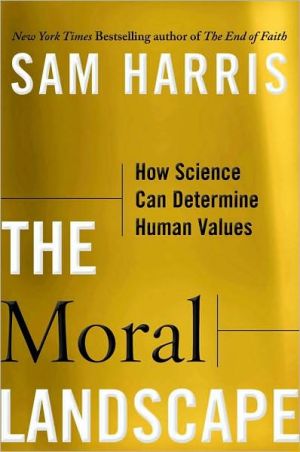The Moral Landscape: How Science Can Determine Human Values
"Sam Harris's first book, The End of Faith, ignited a worldwide debate about the validity of religion. In the aftermath, Harris discovered that most people---from religious fundamentalists to nonbelieving scientists---agree on one point: science has nothing to say on the subject of human values. Indeed, our failure to address questions of meaning and morality through science has now become the most common justification for religious faith. It is also the primary reason why so many secularists...
Search in google:
Bestselling author Sam Harris dismantles the most common justification for religious faith—that a moral system cannot be based on science. Sam Harris's first book, The End of Faith, ignited a worldwide debate about the validity of religion. In the aftermath, Harris discovered that most people—from religious fundamentalists to nonbelieving scientists—agree on one point: science has nothing to say on the subject of human values. Indeed, our failure to address questions of meaning and morality through science has now become the most common justification for religious faith. It is also the primary reason why so many secularists and religious moderates feel obligated to "respect" the hardened superstitions of their more devout neighbors.In this explosive new book, Sam Harris tears down the wall between scientific facts and human values, arguing that most people are simply mistaken about the relationship between morality and the rest of human knowledge. Harris urges us to think about morality in terms of human and animal well-being, viewing the experiences of conscious creatures as peaks and valleys on a "moral landscape." Because there are definite facts to be known about where we fall on this landscape, Harris foresees a time when science will no longer limit itself to merely describing what people do in the name of "morality"; in principle, science should be able to tell us what we ought to do to live the best lives possible. Bringing a fresh perspective to age-old questions of right and wrong and good and evil, Harris demonstrates that we already know enough about the human brain and its relationship to events in the world to say that there are right and wrong answers to the most pressing questions of human life. Because such answers exist, moral relativism is simply false—and comes at increasing cost to humanity. And the intrusions of religion into the sphere of human values can be finally repelled: for just as there is no such thing as Christian physics or Muslim algebra, there can be no Christian or Muslim morality. Using his expertise in philosophy and neuroscience, along with his experience on the front lines of our "culture wars," Harris delivers a game-changing book about the future of science and about the real basis of human cooperation. The Barnes & Noble Review It used to be a given that religion was the source of all important knowledge. Both the "how" of the universe -- what it is like, and how it works -- and the "why" -- why it exists at all, and why human life has a place in it -- were to be answered by referring to religious stories and authorities. With the rise of modernity questions of the first sort were removed from religion's purview: we think of them now as scientific questions, to be answered by empirical investigation. But many defenders of religion cling to the idea that, while science is the proper venue for "how" questions, we must still turn to religion to find answers to questions of meaning and purpose, of the value of human life, and of moral behavior. But why should this be? In part, as Sam Harris notes in his new book, The Moral Landscape: How Science Can Determine Human Values, it is because secular liberals have tended to accept a form of moral skepticism or relativism, according to which there are no moral truths at all other than those that can be asserted within a particular cultural context. The idea of an objective moral truth, then, is something that secularists have largely abandoned to believers.
Introduction The Moral Landscape 1Chapter 1 Moral Truth 27Chapter 2 Good and Evil 55Chapter 3 Belief 113Chapter 4 Religion 145Chapter 5 The Future of Happiness 177Acknowledgments 193Notes 195References 239Index 281
\ From Barnes & NobleSam Harris' The End of Faith (2004) and Letters to a Christian Nation (2006) drew prominent coverage for their reasoned attacks on organized religion. Moral Landscape, his most significant and affirmative work yet, explains how science, particularly neuroscience, can determine human values. This extensive, 320-page work, Harris' first book in four years, received major reviews. Now in a paperback edition that includes a new afterword.\ \ \ \ \ \ Publishers WeeklyHarris argues forcefully for the superiority of science over religion as a means of determining morality and understanding the subtle gradations between permanent truths and culturally and historically determined values. Harris reads his own book, and the passion of his writing does not always come through in his own performance: he reads more than performs, his voice never quite conveying the emotion or certainty that fills nearly every sentence of his book. Still, there is a knowingness in his voice that reminds us that it is the author himself speaking, and readers might appreciate that feeling of intimacy. A Free Press hardcover. (Oct.)\ \ \ From the Publisher“Sam Harris breathes intellectual fire into an ancient debate. Reading this thrilling, audacious book, you feel the ground shifting beneath your feet. Reason has never had a more passionate advocate.”\ —Ian McEwan\ Beautifully written as they were (the elegance of his prose is a distilled blend of honesty and clarity) there was little in Sam Harris's previous books that couldn't have been written by any of his fellow 'horsemen' of the 'new atheism'. This book is different, though every bit as readable as the other two. I was one of those who had unthinkingly bought into the hectoring myth that science can say nothing about morals. To my surprise, The Moral Landscape has changed all that for me. It should change it for philosophers too. Philosophers of mind have already discovered that they can't duck the study of neuroscience, and the best of them have raised their game as a result. Sam Harris shows that the same should be true of moral philosophers, and it will turn their world exhilaratingly upside down. As for religion, and the preposterous idea that we need God to be good, nobody wields a sharper bayonet than Sam Harris.\ —Richard Dawkins\ “Reading Sam Harris is like drinking water from a cool stream on a hot day. He has the rare ability to frame arguments that are not only stimulating, they are downright nourishing, even if you don’t always agree with him! In this new book he argues from a philosophical and a neurobiological perspective that science can and should determine morality. His discussions will provoke secular liberals and religious conservatives alike, who jointly argue from different perspectives that there always will be an unbridgeable chasm between merely knowing what is and discerning what should be. As was the case with Harris’ previous books, readers are bound to come away with previously firm convictions about the world challenged, and a vital new awareness about the nature and value of science and reason in our lives.”\ —Lawrence M. Krauss, Foundation Professor and Director of the ASU Origins Project at Arizona State University, author of The Physics of Star Trek, and, Quantum Man: Richard Feynman’s Life in Science\ “A lively, provocative, and timely new look at one of the deepest problems in the world of ideas. Harris makes a powerful case for a morality that is based on human flourishing and thoroughly enmeshed with science and rationality. It is a tremendously appealing vision, and one that no thinking person can afford to ignore.”\ —Steven Pinker, Harvard College Professor of Psychology, Harvard University, and author of How the Mind Works and The Blank Slate.\ \ \ \ \ \ The Barnes & Noble ReviewIt used to be a given that religion was the source of all important knowledge. Both the "how" of the universe -- what it is like, and how it works -- and the "why" -- why it exists at all, and why human life has a place in it -- were to be answered by referring to religious stories and authorities. With the rise of modernity questions of the first sort were removed from religion's purview: we think of them now as scientific questions, to be answered by empirical investigation. But many defenders of religion cling to the idea that, while science is the proper venue for "how" questions, we must still turn to religion to find answers to questions of meaning and purpose, of the value of human life, and of moral behavior.\ But why should this be? In part, as Sam Harris notes in his new book, The Moral Landscape: How Science Can Determine Human Values, it is because secular liberals have tended to accept a form of moral skepticism or relativism, according to which there are no moral truths at all other than those that can be asserted within a particular cultural context. The idea of an objective moral truth, then, is something that secularists have largely abandoned to believers.\ \ \







